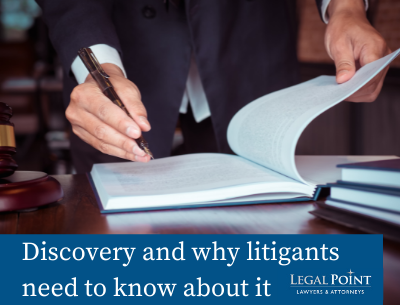
Discovery and why litigants need to know about it
Are you unsure about suing someone?
You can consider ‘discovery’ to obtain access to documents in the other party’s possession relevant to the matter in question. As a result, you may have access to the necessary resources to prove a case. However, preliminary discovery is a remedy, not a right, pursuant to the court’s discretion. As part of the court’s assessment, the court must balance the needs of the plaintiff against the privacy of the respondent. This article will examine the purposes, benefits and limitations of discovery with support of real-life case examples.
Purpose of Discovery
The history of discovery dates to the 19th Century. Generally, there are three purposes of discovery:
1. It minimises the possibility of surprise;
2. It causes litigation to be fair by placing the parties in an equal position at the final hearing; and
3. It assists with identifying the issues in dispute.
Therefore, the parties have access to possible benefits such as enabling an earlier appraisal by the parties of their cases and consequently promote settlement, save time and reduce legal costs. Litigants will be more informed in their decision-making and settlements will more likely represent the real merits of the matter.
Limitations to Discovery
a) Documents cannot be discovered if they are shielded by privilege. Examples of privilege include, but are not limited to, legal professional privilege between solicitor and client; privilege against self-incrimination; public interest immunity; and privilege attached to ‘without prejudice’ documents.
b) The party who receives the discovered materials must not use it for purposes outside of the proceedings. Failure to uphold this obligation may be deemed as contempt of court, which attracts serious consequences.
c) Document must be in the possession or under the control of a party.
Case example: Discovery to identify a defendant
The rise in globalisation and international trade in the modern world have caused the identification of an appropriate defendant very difficult. For example, in Norwich Pharmacal Co v Customs & Excise Commissioners [1974], the plaintiff successfully obtained court orders for discovery to identify who was importing chemicals into England in breach of the plaintiff’s patent.
Case example: Discovery to assist with proof of a case
In Bank of New South Wales v Undaunted Gold Mining Co (1870), the defendant had refused to admit cheques drawn on the plaintiff bank. Discovery orders were granted in favour of the plaintiff for the purpose of accessing the defendant’s books. With this information, the plaintiff could prove that the defendant had drawn the cheques on the plaintiff.
Conclusion
Discovery is a very useful remedy when litigants do not have a complete understanding of the facts, issues and evidence. Purposes of discovery include reducing the chance of surprise at trial; ensuring an equal footing between the parties; and point out the issues in dispute. However, an order for discovery is not immediately granted by the courts. To ensure that you have a good chance, our experience litigation team can help with the preparation of court documents.
Disclaimer:
This publication provides general information of an introductory nature and is not intended and should not be relied upon as a substitute for legal or other professional advice. While every care has been taken in the production of this publication, no legal responsibility or liability is accepted, warranted, or implied by the authors or our firm, and any liability is hereby expressly disclaimed.

Ge Wu is the solicitor director of Legal Point Lawyers & Attorneys. He has been admitted to practise law since 2005. Throughout his practice, Ge Wu predominantly practises in the areas of Property Law, Immigration Law, Commercial Law, Civil Litigation and Family Law.
His experience covers all aspects of property law, commercial/retail lease, immigration law and civil litigation, while at the same time, he also has experience in family law, criminal law and other areas such as will-drafting and general advice.
He has frequently been instructed by corporate clients in pre-acquisition due diligence reports, structuring property development, land/shopping centre acquisitions, G.S.T. and stamp duty advice for buying/selling businesses, as well as share transfers and company re-structures.
Ge Wu has been appointed as Notary Public since 2011 and started to provide Notary Public service to clients from different cultural backgrounds.
